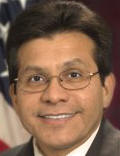Gonzales Proposes Data Retention Mandate,
Web Site Labeling, and Ban on Deceptive Source Code
April 20, 2006. Attorney General Alberto Gonzales gave a speech in Alexandria, Virginia, in which he proposed that internet service providers (ISPs) be required to retain data. The Department of Justice (DOJ) also released a draft bill [PDF] that would require web site operators to label web sites that contain "sexually explicit material", and criminalize the deceptive use of words in the source code of certain web sites.
Gonzales' argument for a data retention mandate is that the internet is used to disseminate child pornography (CP), that the federal government wants to enforce laws that criminalize CP, and that requiring all ISPs to retain data will facilitate investigation and prosecution of CP laws.
The Center for Democracy and Technology (CDT) responded that "Data retention requirements would be burdensome, raise serious privacy concerns, and be of questionable value given existing laws that require ISPs to preserve data at the request of law enforcement."
 Gonzales (at right) said
that "we have to make sure law enforcement has all the tools and information it
needs to wage this battle. The investigation and prosecution of child predators
depends critically on the availability of evidence that is often in the hands of
Internet service providers. This evidence will be available for us to use only
if the providers retain the records for a reasonable amount of time.
Unfortunately, the failure of some Internet service providers to keep records
has hampered our ability to conduct investigations in this area."
Gonzales (at right) said
that "we have to make sure law enforcement has all the tools and information it
needs to wage this battle. The investigation and prosecution of child predators
depends critically on the availability of evidence that is often in the hands of
Internet service providers. This evidence will be available for us to use only
if the providers retain the records for a reasonable amount of time.
Unfortunately, the failure of some Internet service providers to keep records
has hampered our ability to conduct investigations in this area."
He continued that "I have asked the appropriate experts at the Department to examine this issue and provide me with proposed recommendations. And I will reach out personally to the CEOs of the leading service providers, and to other industry leaders, to solicit their input and assistance. Record retention by Internet service providers consistent with the legitimate privacy rights of Americans is an issue that must be addressed."
He also said that the Bush administration "will send to Congress a new piece of legislation, the Child Pornography and Obscenity Prevention Amendments of 2006. This legislation will help ensure that communications providers report the presence of child pornography on their systems by strengthening criminal penalties for failing to report it. It will also prevent people from inadvertently stumbling across pornographic images on the Internet. I hope Congress will take up this legislation promptly."
He concluded, "I have directed my staff to see what else we can do."
The DOJ sent a letter and proposed bill [10 pages in PDF] to House Speaker Denny Hastert. This draft bill does not include a data retention mandate. Gonzales did not explain in his speech how this data retention mandate would operate.
However, this draft bill would toughen the existing requirement that service providers report violations of CP laws, compel web site operators to label web sites that contain "sexually explicit material", and criminalize the deceptive use of words in web page source code.
First, the draft bill would impose large criminal penalties on upon a "provider of electronic communication services or remote computing services" who "knowingly and willfully fails" to report violations of CP laws.
Second, it would compel speech on web sites with "sexually explicit material". The draft bill provides that "No person who operates a website located on the Internet where such website is primarily operated for commercial purposes ... may knowingly, and with knowledge of the character of the material, place on that website sexually explicit material, and (A) fail to include on each page of the website that contains sexually explicit material, the marks and notices prescribed by the Commission under this subsection; and (B) fail to provide that the matter on the website that is initially viewable, absent any further actions by the viewer, does not include any sexually explicit material."
This provision would not apply to "a telecommunications carrier engaged in the provision of a telecommunications service" or to "a person engaged in the business of providing an Internet access service".
Third, the draft bill would criminalize deceptive uses of words in the metatags or other source code of certain web pages. It provides that "Whoever knowingly embeds words or digital images into the source code of a website with the intent to deceive a person into viewing material constituting obscenity shall be fined under this titled or imprisoned not more than 2 years, or both."
It also provides that "Whoever knowingly embeds words or digital images into the source code of a website with the intent to deceive a minor into viewing material harmful to minors on the Internet shall be fined under this title or imprisoned not more than 4 years, or both."
TLJ published a story titled "Keyword Deception Is Common In Political Web Sites" on September 3, 1999. This story addressed the deceptive use of words in the source code of web sites of political candidates and committees to drive traffic to these web sites. These were political, not CP, websites. However, the methods for using source code to attract traffic are the same.
Several Republican candidates for President, including Sen. Orrin Hatch (R-UT), Sen. John McCain (R-AZ), and former Vice President Dan Quayle, used deceptive keywords. George Bush did not. Also, both the Republican National Committee and the Democratic National Committee used keyword deception.
See, also, table
titled "Summary of Features of Web Sites of Presidential Candidates and other Political
Entities".